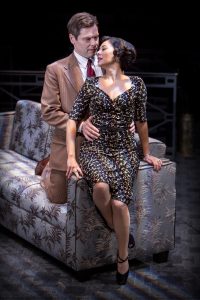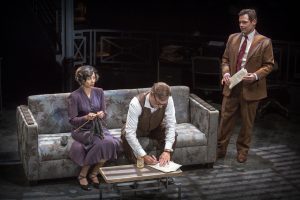What Evil Lurks Behind the Lust? Double Indemnity at the Old Globe
Greed, sex, trickery, violence, sleaze, shadows, fedoras, cigarettes, crazy eyes, the double cross…what’s not to like about Double Indemnity except maybe the boring title?
It’s an oft-told tale. James M. Cain wrote the novel in 1935 based on a notorious murder case of 1927. The Billy Wilder film with Barbara Stanwyck, Fred MacMurray and Edward G. Robinson came out in 1944 with a screenplay by Wilder and Raymond Chandler. Since then it’s ascended to the top of most great movie lists, setting the tone for what’s often called “film noir.” It’s been a radio play, a television movie and now it’s been adapted for the stage, by David Pichette and R. Hamilton Wright.
And the Old Globe’s got it, in a dark, sweaty, head-shaking production staged by John Gould Rubin, surely a keeper on the list of new directors.
Time to confess that I have no memory of seeing the film (my mom would have kept me away when it was new) and I’ve never read the book. Now, I may need to do neither, though accounts of those originals suggest that some of the murky details in this play have been recent additions.
This is not a piece that needs a precise plot, even though that’s what it’s about. The insurance agent and the victim’s wife plan his “accidental” death so they can start their life together with the payoff on a forged policy. It nearly works for them but nothing’s perfect.
What’s fascinating is how the imperfection plays out.
The agent is to all appearances a model citizen striver, right up until he drops by a customer’s home on policy renewal business. The customer isn’t home but the wife is, and she’s a poison flower just standing there. Sparks fly, pulses race and innuendo threatens to drown the two until they finally leap at each other’s bodies, clawing. And without even a post-coital smoke, they’re plotting. “He’ll be better off dead,” she cries in giddy rationalization. “Maybe he won’t think so,” says the agent and they both collapse in horrified, excited laughter.
In a flurry of slick salesmanship, forms signed and checks made out for tiny 1937 amounts (the payoff for all this won’t be much more than a lousy $50 grand!), the deal is done and the plot starts ticking, right away with complications. There’s a ditzy teenage daughter from the husband’s first marriage. And her pimply boyfriend, who needs cash quick to publish his master’s thesis at USC (huh?) and get a better job. And of course there’s a lot of raw lust to be dealt with, on all sides.
So the deed gets done, with messy details and unexpected dangles including the agent’s best friend at the office, a tough old claims adjuster, who refuses to accept the “accident” as real.
Those were the days in popular fiction when the cops were all either stupid or corrupt – or both – so this is far from what we now think of as a “police procedural.” This crime is gonna get solved only because an old bloodhound won’t heel. And also because, well, people are people.
Thanks to John Gould Rubin and some crackerjack Globe actors, these people certainly seem real. If you can buy the notion that folks sometimes crack under the strain of being good and succumb to the dark side, well, here they are.
Michael Hayden’s insurance agent is a beefy, shrewd, unflappable guy with a salesman’s sheen, but he seems never to have stumbled across anything like Angel Desai’s smoldering, restless housewife. They paw at each other, swapping needy and not-so-fast roles at a dizzy pace. They don’t flash crazy, just urgent. They can’t be still for long. He surreptitiously wipes his palms on the furniture. She drops her panties. They seem caught in a pageant of carnal desperation.
Rubin lets all his actors rip away at their roles, punctuating brief exposures with telling details. Vayu O’Donnell kicks furniture as a spoiled scion in the family insurance business, biting back frustration, and later wiseguys around the pliable Megan Ketch in smalltime punk style. Ketch inhabits an elaborate fantasy world as the vulnerable daughter but has time to play a quick secretary shouted at by Murphy Guyer, playing that dogged claims sleuth with grit and surprising depth. Guyer’s doomed husband character emerges as the most done with the least, a complete and plausible guy seen only briefly but known thoroughly.
And it’s not just the way Rubin aids and abets his cast that makes this show grip so well. He shakes up the angles and keeps things always moving, using Christopher Barreca’s stark set, which offers a big piece and a little piece, anchored to a revolve and packed with tricks that usually work. Also, there’s a dark translucent cube that drops to enclose the central playing area of the White Theatre’s arena and serves as both curtain and screen for Keith Skretch’s subtle, understated projections, like rain on a windshield and scudding clouds. Stephen Strawbridge’s skilled lighting links together a stage picture that’s literal only around the edges but endlessly atmospheric, the tension maintained by Kwan-Fai Lam’s original music.
David Israel Reynoso, working in costume period of vivid possibilities, never gets too cute or wanders away from a useful realism.
Admittedly, the ending of this show strains the artists’ resources and the audience’s belief. But it doesn’t much matter who gets killed and how. What’s left is a renewed wonder at the way things can turn out.
[box] Continues in the White Theatre at 7 p.m. Tuesdays, Wednesdays and Sundays; 8 p.m. Thursdays-Saturdays; and 2 p.m. Saturdays and Sundays through Sept 1, 2013.[/box]

Welton Jones has been following entertainment and the arts around for years, writing about them. Thirty-five of those years were spent at the UNION-TRIBUNE, the last decade was with SANDIEGO.COM.




